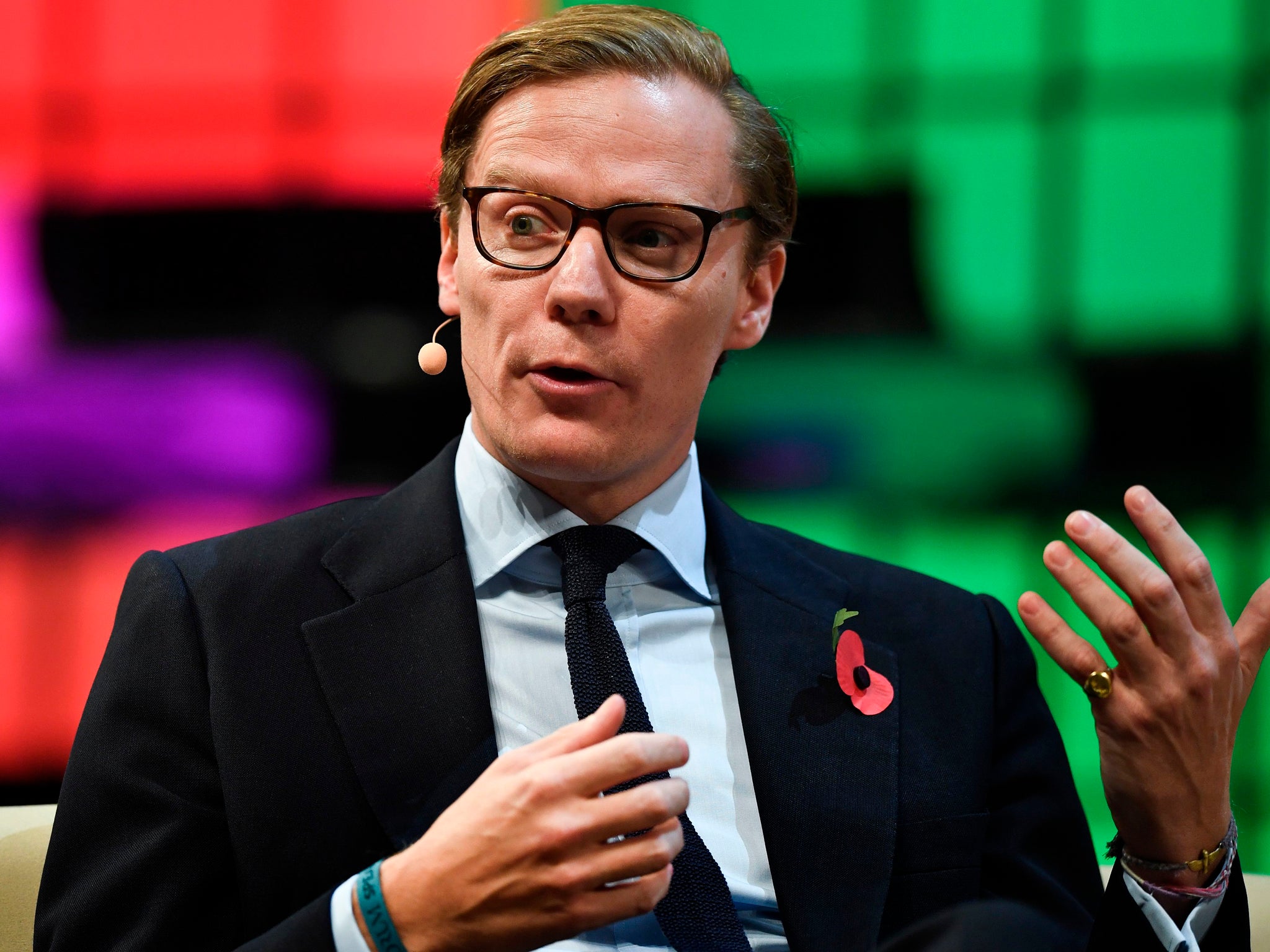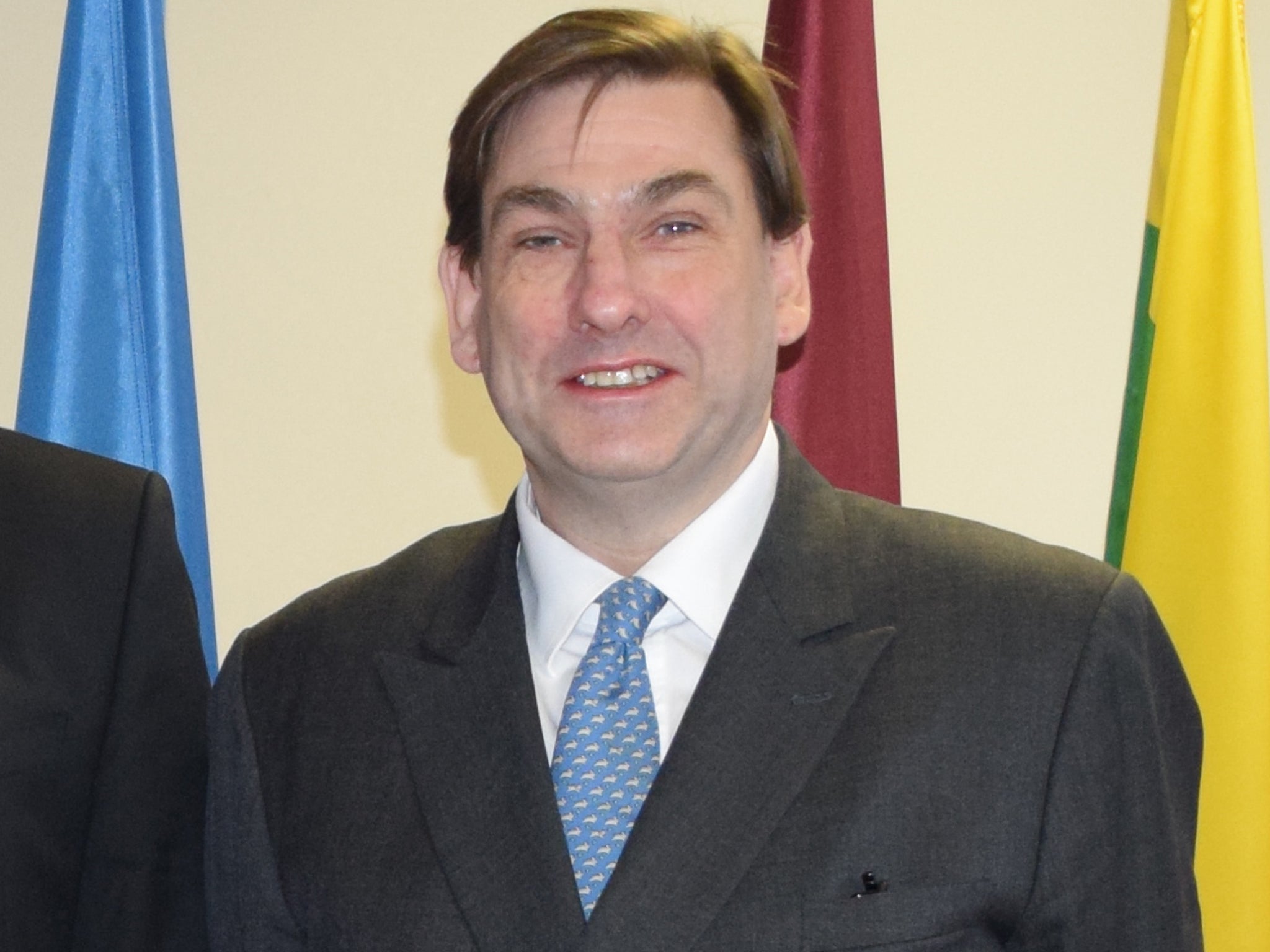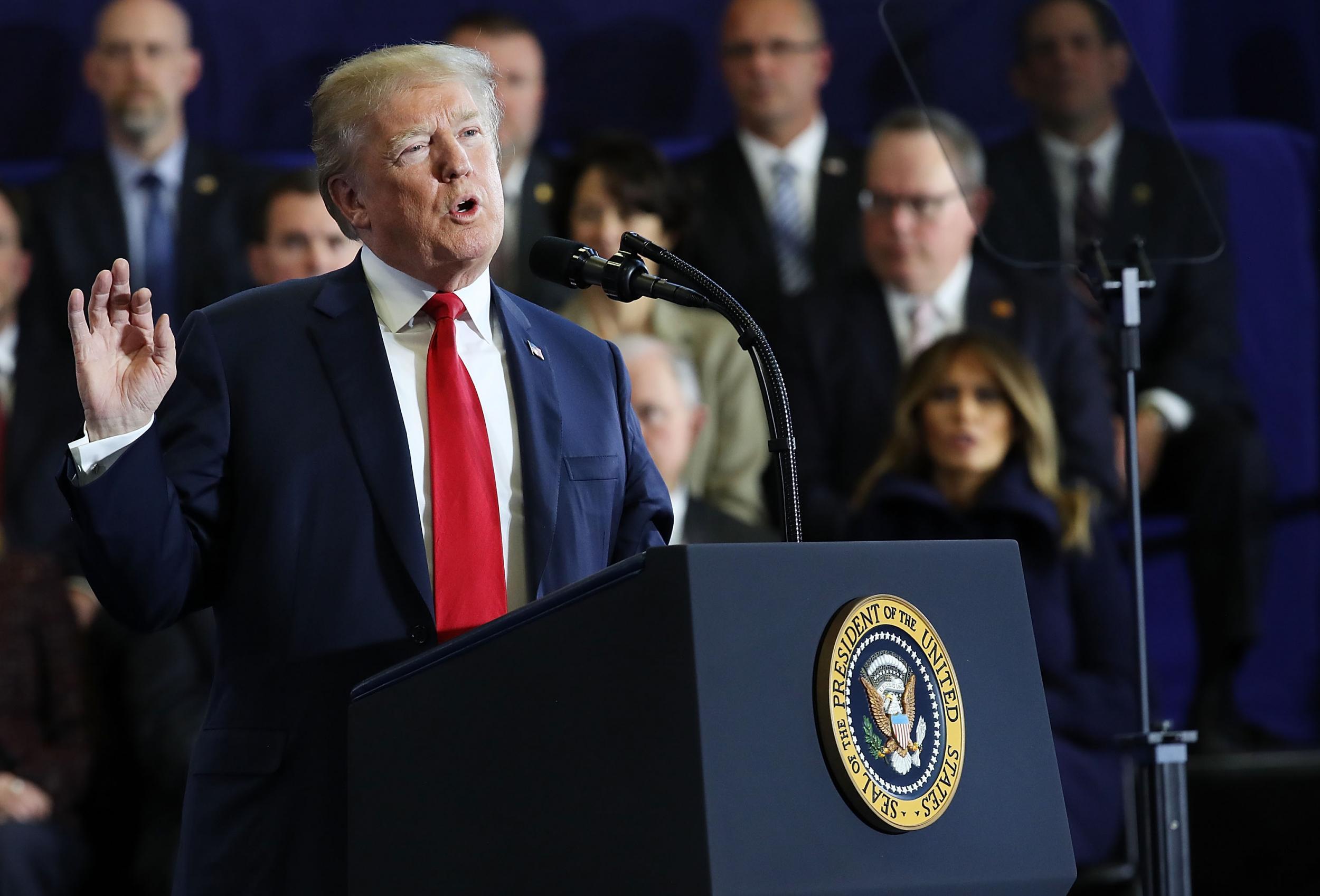Cambridge Analytica: Who are they, and did they really help Trump win the White House?
After the claims made by whistleblower Christopher Wylie, some have suggested the company might be all-powerful, but others wonder if it was more master of PR than master of the universe

Your support helps us to tell the story
From reproductive rights to climate change to Big Tech, The Independent is on the ground when the story is developing. Whether it's investigating the financials of Elon Musk's pro-Trump PAC or producing our latest documentary, 'The A Word', which shines a light on the American women fighting for reproductive rights, we know how important it is to parse out the facts from the messaging.
At such a critical moment in US history, we need reporters on the ground. Your donation allows us to keep sending journalists to speak to both sides of the story.
The Independent is trusted by Americans across the entire political spectrum. And unlike many other quality news outlets, we choose not to lock Americans out of our reporting and analysis with paywalls. We believe quality journalism should be available to everyone, paid for by those who can afford it.
Your support makes all the difference.Two weeks before the US Presidential election, a British businessman with a fondness for Savile Row suits and polo made an extraordinary boast to a reporter from the Washington Post.
Alexander Nix - ‘Bertie’ to his chums from Eton and elsewhere - said his company had developed a psychological model for identifying voters that could “determine the personality of every single adult in the United States of America.”
And, Bertie seemed to imply, through the power of so-called “big data and psychographics”, his company was going to help Donald Trump win the election.
Of course, everyone knew Hillary was going to win, so no-one really paid any attention to Bertie, or what the Washington Post described as his “little-known company”, Cambridge Analytica.
Until election night.
Three days after Donald Trump became President-Elect of the United States, Cambridge Analytica issued a press release, modestly entitled: “The Data Gurus Who Anticipated the Election Result”.
It began with a quote from veteran pollster Frank Lutz: “There are no longer any experts except Cambridge Analytica. They were Trump’s digital team who figured out how to win.”
Suddenly everybody wanted to know about Cambridge Analytica, the firm which may – or may not – have had links with the Brexit campaign and whose website (still) promises that it “uses data to change audience behaviour”.
There were sceptics. One Republican political consultant told The Spectator that Trump had been “played for a rube” by people spouting expensively packaged “nonsense”. But there weren’t many sceptics.
After being informed by Mr Nix that “Creative-led blanket advertising is being replaced by data-driven individualised advertising”, The Spectator concluded: “Don Draper is dead — replaced by a twentysomething chugging Diet Coke at a laptop.”

Now, though, it seems that the useful, computer coding twentysomething has stopped chugging Coke and starting talking, to journalists.
He goes by the name of Christopher Wylie and he’s still only 28, although he started working for Cambridge Analytica in the early days, in 2014.
“The data nerd who came in from the cold,” The Observer called him.
The gay Canadian vegan who somehow ended up creating “Steve Bannon’s psychological warfare mindfuck tool” was how the pink-haired, nose-pierced Wylie described himself.
Cambridge Analytica, Wylie claimed, had been involved in harvesting the personal information of some 50 million Facebook users without proper authorisation.
And now Wylie has given further details to the Washington Post about how he worked with Steve Bannon, who was Cambridge Analytica’s vice-president between June 2014 and August 2016, with Mr Nix as chief executive.
During this time, Wylie admitted, his data mining helped the firm discover how young, conservatively-minded whites responded positively to certain phrases, like “drain the swamp”, or “deep state”.
The same groups, Cambridge Analytica found, also liked the idea of a big wall to keep out immigrants.
Bannon, Wylie and the Washington Post made clear, might not have known the detail of how Cambridge Analytica got its data or that it might have been harvested from Facebook.
And, Wylie added, in 2014: "Trump wasn't in our consciousness. This was well before he became a thing. He wasn't a client or anything."

But Bannon went on to become the presidential candidates’s chief strategist and, in many people’s eyes, his eminence grise, the controlling intelligence behind Donald Trump’s brute force and ignorance.
Wylie, it seems, watched horrified as those messages become core slogans in the campaign speeches of Donald Trump.
And shortly before Wylie spoke to the Washington Post, it emerged that Bertie himself had been boasting, this time to a wealthy Sri Lankan businessman who turned out to be an undercover reporter for Channel 4 News.
Cambridge Analytica, Mr Nix seemed to be suggesting, could use more than data to change audience behaviour. Women, the covert recording seemed to reveal him saying, could be hired to entice a political rival into the kind of reputation-destroying honeytrap that could be leaked to the media.
“We could send some girls around to the candidate's house,” Mr Nix seemingly declared. “We could bring some Ukranians in on holiday with us, you know what I'm saying? They are very beautiful. I find that works very well.”
Mr Nix, 42, has now been suspended by the Cambridge Analytica board “pending a full independent investigation”.
There has also been a flurry of denials from Cambridge Analytica to every publicly aired allegation.
But those of conspiratorial mind might start to wonder whether the tale of Bertie and his Cambridge Analytica pals suggests that while Old Etonians like David Cameron can be PM until unseated by Brexit, other Old Etonians decide - and keep on deciding - who runs the country.
There is, though, an alternative interpretation, one that requires a look at who Mr Nix and his Cambridge Analytica partners are, and which wonders whether they might be smart, smooth-talking members of the upper class whose PR far outstrips their actual power.
Or, to express the possibility in the rather more colourful language of a rival, American, Republican data scientist: “They’ve got a Brit wearing Savile Row suits who gives you a great pitch …but with psychographic profiling there’s nothing there. They’re really, really smart people … like a bunch of board-certified doctors who decided to make a lot more money selling snake oil.”
There seems little doubt they made a pile of money.
When Mr Nix was boasting to the Washington Post about the power to determine the personality of every single adult, the newspaper was quoting federal filings showing the Trump campaign’s payments to Cambridge Analytica had come to $5m in September 2016.
It also seems that the people at the top of Cambridge Analytica and its London-based parent company the SCL Group are exceedingly well connected.
Among those who co-founded the group with Mr Nix in 2005 was Sir Geoffrey Pattie, a former defence minister and trade minister under Margaret Thatcher who was also vice-chairman of the Conservative Party in 1990. Sir Geoffrey, reported by The Times to have been the group’s founding chairman, resigned from SCL in 2008.
When Cambridge Analytica itself was created in 2013, it was reportedly backed by $15m ($10.7m) from Robert Mercer, the hedge fund billionaire and Republican party donor who until last year had a stake in Breitbart, the “alt-right” news website co-founded by Steve Bannon.
Another co-founder of the SCL Group, who retains a key role in it, is Nigel Oakes, 55.

Mr Oakes, The Independent reported in August 2000, had, like Mr Nix, been to Eton and, again, those who met him spoke of his charm, good manners and immaculate tailoring.
Such attributes may have helped him gain his first brief brush with public attention as the boyfriend, between November 1983 and May 1984, of the minor Royal Lady Helen Windsor, the daughter of the Duke of Kent.
According to The Times, his career prior to the SCL Group also included a spell running a mobile disco called Traitor.
By the time he caught The Independent’s attention in 2000, though, he was working from a very high-tech office in Jakarta as image consultant to Indonesian President Abdurrahman Wahid.
At least one of his employees thought the suave Old Etonian, with his mysterious working methods, was worthy of comparison with 007.
“We called him Mr Bond,” the employee said, “Because he is English, and such a mystery.”
At the same time, however, The Independent’s correspondent seemed less than impressed with Mr Oakes’ image management, writing: “The use of international PR agencies by national leaders and their governments has become commonplace … But for all his computers and camera equipment, Mr Oakes was hardly in the same league. His work appears to have been rather limited.”
Mr Oakes, though, does not seem ever to have shared such doubts about his abilities.
In 1992, having started another consultancy business specialising in "behavioural influence", he told the trade magazine Marketing that to get people's agreement on a functional level you had appeal to them on an emotional level, reportedly characterising this approach as: "We use the same techniques as Aristotle and Hitler”.
Mr Nix, Mr Oakes and Mr Bannon, then, were some of the people into whose orbit Mr Wylie entered in 2014 when he accepted Mr Nix’s offer of work, which, according to The Observer, came wrapped in the enticing promise: “We’ll give you total freedom. Come and test out all your crazy ideas.”
Mr Wylie, of course, did not have Bertie or Nigel’s schooling or pedigree. Diagnosed with ADHD and dyslexia as a teenager, he had left a Canadian school aged 16 without a single qualification.
But he had taught himself to code aged 20, and he was, according to a senior politician who has known him since about that time, “One of the brightest people you will ever meet.”
Aged 24, Wylie was thrilled at the intellectual possibilities presented by Cambridge Analytica and the chance to test “crazy ideas” about developing digital data.
Now, older, possibly wiser, and no longer working for the company, he seems to regard what he did in a different light.
According to a friend who spoke to The Observer, Wylie fears he has helped create the Cambridge Analytica “data Frankenmonster”.
While always insisting there is nothing sinister behind it, Mr Nix has at times seemed to revel in the power of the company’s creation.
Soon after Trump’s victory he was quoted by Switzerland’s Das Magazin as saying: “Pretty much every message that Trump put out was data-driven.”
Das Magazin reported that before Trump’s team was able to test 175,000 different variations for his arguments.
From July 2016, the report said, Trump canvassers were provided with an app allowing them to identify the political views and personality type of a given house, and the outline conversation scripts that would work with the inhabitants.
“We can address villages or apartment blocks in a targeted way. Even individuals,” Mr Nix was quoted as saying.
And before the election in America, there was the Brexit vote in the UK.
In February 2016, four months before the referendum, an article with the byline “Alexander Nix” appeared in Campaign, the magazine for the marketing and advertising industries.
“Recently,” the article said, “Cambridge Analytica has teamed up with Leave.EU – the UK’s largest group advocating for Breixt – to help them better understand and communicate with UK voters. We have already helped supercharge Leave.EU’s social media campaign by ensuring the right messages are getting to the right voters online, and the campaign’s Facebook page is growing in support to the tune of about 3,000 people per day.”
This was also four months before Cambridge Analytica was hired by Team Trump. So the article instead detailed the firm’s role in helping Ted Cruz achieve a “stunning victory” over “bombastic billionaire Donald Trump” in the Iowa Republican presidential primary.
“Cambridge Analytica (CA) worked with the campaign for over a year to develop predictive data models in order to identify, engage, persuade and turnout voters for Cruz,” the article stated.
“CA was able to provide the campaign with predictive analytics based on more than 5,000 data points on every voter in the United States. From there, CA’s team of political consultants and psychologists guided the campaign on what to say and how to say it to specific groups of voters.
“The degree of granularity that can be achieved when you have the right data and the tactical operation to put it into action is incredible
“Ultimately, what made the difference in Iowa was that Senator Cruz used data analytics to gain an in-depth understanding of Iowa voters, and then used every communication tool at his disposal to talk to them directly. Meanwhile, Donald Trump was delivering the same message to an indistinguishable mass of voters who he didn’t really understand – and the rest is history.”
There were some who refused to believe.
Eitan Hersh, a Yale professor and author of Hacking the Electorate was quoted as saying that Cambridge Analytica’s claim about predicting personality was “basically impossible. . . . You can do better randomly guessing.”
But Hersh said that before the US election, and anyway he is an expert – and as we all know, people have had enough of experts.
Perhaps, therefore, sceptics about the power of psychographics should rely on the word of … er, Mr Nix of Cambridge Analytica.
In late February 2018, as worries about Cambridge Analytica’s influence grew, but before the current set of allegations emerged, the chief executive was questioned by MPs on the Commons Digital, Culture, Media, and Sport Committee.
He was reassurance itself.
That February 2016 Campaign article, he said, the one alleging a link-up with the Brexit campaign and spectacular results on behalf of Ted Cruz: he never wrote it.
Despite it carrying his byline, it had been authored by a “slightly overzealous PR consultant”.
Alas, he added, “We tried to correct the press again and again and again, but unfortunately and somewhat ironically this was an example of fake news that got disseminated and spun out virally.”
Cambridge Analytica might have sought Brexiteer custom, he insisted, but it never got it. Leave.EU didn’t give them the chance to influence the referendum, said Mr Nix: “We dated each other, we had a couple of dinners, we didn’t get married.”
And despite whatever impressions some people might have formed about Cambridge Analytica, they weren’t the masters of the universe. They were just a “small technology company”.
“Do you see yourselves as an all-powerful presence with all this knowledge and data that you’ve got?” asked Tory MP Rebecca Pow.
“That’s very flattering that you might suggest people might see us as having these incredible powers,” replied the Old Etonian. “[But] what we’re doing is really no different to what the advertising industry at large is doing across the commercial space.”
“We are a small technology company,” he insisted. “The science of political campaigning goes back hundreds of years and what we’re doing is a natural evolution to what’s been done before and many other people are doing as well.”
There have been further clarifications since Mr Wylie started talking, not least an insistence that Cambridge Analytica had never claimed it won the election for Donald Trump.
"This is patently absurd," the company said. "We are proud of the work we did on that campaign, and have spoken in many public forums about what we consider to be our contribution to the campaign."
In fact, since Cambridge Analytica only joined Team Trump in June 2016, five months before the election, there was a limit to the sophistication of the operation that they could launch – as the company had explained shortly after the election.
Faced with setting up an entire data operation from scratch, it had relied a lot more than it normally would have done on conventional polling, simply using its cutting edge “psychographics” to get sharper predictions from the conventionally acquired data.
No Facebook data was used, the company said, and there was no personality-targeted advertising for the Trump campaign either.

In fact, a close re-reading of that press release about “Data Gurus Who Anticipated the Election Result” might suggest that, for all the invincible aura now surrounding Cambridge Analytica, it never straight out said Trump was going to win.
“The firm knew that Mr. Trump had a very solid shot at winning,” is what the press release actually says, along with a quote from Matt Oczkowski, Cambridge Analytica’s Head of Product: “The outcome was very difficult to predict, and we didn’t get every state right, but we saw the trends.”
The Spectator reported that Cambridge Analytica had given Trump a 30 per cent chance of victory as people went to vote – better than nearly every other pollster, but perhaps not quite proof of unassailable predictive power.
Cambridge Analytica itself has been keen to stress that whatever power it does possess is not used exclusively in the service of a particular right-wing ideology. It might be proud of its work for the Trump campaign, but the company has also insisted: "We work with parties on both the centre-left and the centre-right."
And, the company adds, without naming the companies involved, "most of our work is for commercial brands."
As for the alleged sinister harvesting of Facebook data, Cambridge Analytica says this was received from a “seemingly reputable” contractor “in good faith” in 2014. The company says the data was deleted in its entirety “in co-operation with Facebook” in 2015 “after it subsequently became known that [the contractor] had not adhered to data protection regulation”.
This contractor does have a different take on things, and has spoken of feeling “used as a scapegoat by both Facebook and Cambridge Analytica when we thought we were doing everything appropriately.”
There also seems to be a difference of opinion between Cambridge Analytica and Channel 4 News about the context behind what Mr Nix supposedly said to the undercover reporter.
Mr Nix, according to Cambridge Analytica, had been humouring the ‘Sri Lankan businessman’ in order to test his integrity and see whether this was a client he could work with.
A company press release stated: “A senior Cambridge Analytica executive clearly set out the principles which govern its work and said the following to the undercover reporter:
“‘We’re not in the business of fake news, we’re not in the business of lying, making stuff up, and we’re not in the business of entrapment… There are companies that do this but to me that crosses a line.’
“Despite this clear statement, the undercover reporter later attempted to entrap Cambridge Analytica executives by initiating a conversation about unethical practices.
“After several meetings discussing ostensibly legitimate projects, the reporter unexpectedly and suddenly turned the conversation towards practices such as corruption and the entrapment of political figures.”
“Assessing the legality and reputational risks associated with new projects is critical for us,” the press release explained, “And we routinely undertake conversations with prospective clients to try to tease out any unethical or illegal intentions.
“The two Cambridge Analytica executives at the meeting humoured these questions and actively encouraged the prospective client to disclose his intentions. They left with grave concerns and did not meet with him again.”
There was, though, an acknowledgement that Mr Nix might have been a little ill-judged in how he sought to tease out the potential client’s unethical intentions.
“Alexander Nix acknowledges that on this occasion he misjudged the situation,” the press release says.
It includes a statement from Mr Nix himself: “In playing along with this line of conversation, and partly to spare our ‘client’ from embarrassment, we entertained a series of ludicrous hypothetical scenarios.
“I am aware how this looks, but it is simply not the case. I must emphatically state that Cambridge Analytica does not condone or engage in entrapment, bribes or so-called ‘honeytraps’, and nor does it use untrue material for any purpose.
“I deeply regret my role in the meeting and I have already apologised to staff. I should have recognised where the prospective client was taking our conversations and ended the relationship sooner.”
As for Mr Wylie, the Cambridge Analytica line is that he is “a former contractor who left in 2014 and is misrepresenting himself and the company throughout his comments.”
Mr Wylie, though, has reportedly submitted a dossier of evidence to the UK’s Information Commissioner and is said to have plans to testify to Democrats on the House Intelligence Committee.
It seems Cambridge Analytica, a company imagined by some to be all-powerful, may yet have more to deal with from the once compliant coder.
Join our commenting forum
Join thought-provoking conversations, follow other Independent readers and see their replies
Comments